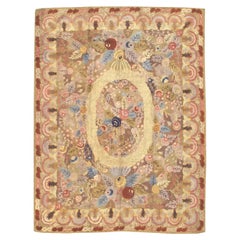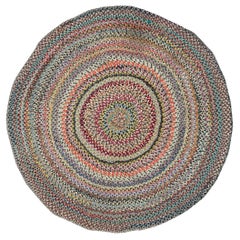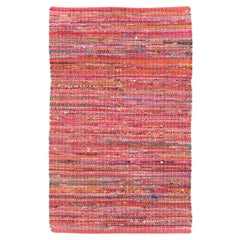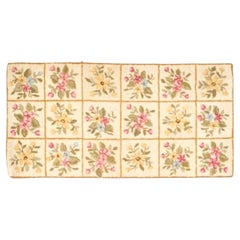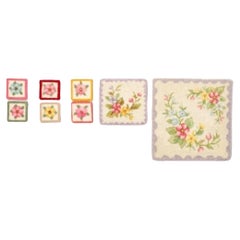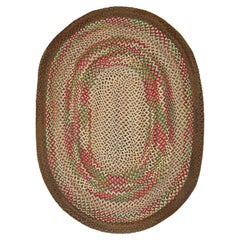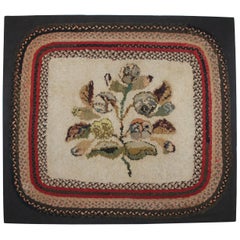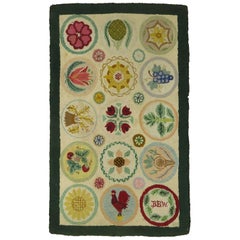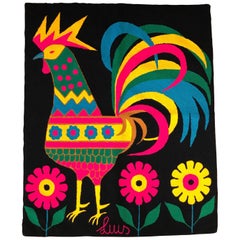Yarn North and South American Rugs
9
to
1
7
9
9
9
2
2
2
1
9
1
6
1
Width
to
Length
to
1,112
2,332
2,100
197
171
9
7
2
Material: Yarn
Antique American Hooked Rug
Located in San Francisco, CA
Hooked rugs are crafted by pulling loops of yarn or sometimes fabric through a stiff woven base usually made of burlap or linen. Rug hooking as a folk art ...
Category
Early 20th Century American Yarn North and South American Rugs
Materials
Yarn
Mid-20th Century Handmade American Braided Round / Circular Accent Carpet
Located in New York, NY
A vintage American Braid round/circular accent rug handmade during the mid-20th century.
Measures: 7' 1" x 7' 1".
Category
Mid-20th Century American American Classical Yarn North and South American Rugs
Materials
Wool, Yarn
Mid-20th Century Handmade American Rag Rug
Located in New York, NY
A vintage American rag rug handmade during the mid-20th century.
Measures: 3' 6" x 5' 8"
North American rugs & carpets:
North American has never developed a unified handmade rug tradition, but rather it is the unassimilated confluence of several. From Mexico comes the Saltillo serape wearing blanket, and this stimulates the Navajo and Rio Grande (Colorado) weavers, first as blankets, then as rugs. The thrifty habits of rural America gave rise to the New England (and Western Canadian) hooked rug types, while the farmers of the Midwest recycled their disused garments into braided and rag rugs.
The closest to a real ongoing tradition are the Southwestern (New Mexican) Navajo rugs. By the 1860s the native tribes were weaving wearing blankets with wool from the Spanish churro sheep. These were in stripe design, with combinations of undyed wool with cochineal reds and indigo blues. The multi-phase “Chief’s Blankets” from the 1870s-80s are a natural outgrowth of these. Machine spun red wool from Germantown in Pennsylvania appeared in the 1870s with a bright red hitherto unobtainable. The weavers loved it and blankets appeared with bright reds, generally aniline, in “eye dazzler” patterns. Anglo traders established posts beginning in the 1890s. Navajo weavings were perfect accompaniments not only for Western-themed decors, but for East Coast apartments, only they needed to be thicker and more rug like to be truly accepted. The traders brought Caucasian and Turkish village rugs to copy, borders were introduced and central medallions devised. The weavers continued to create on vertical looms, with a shared warp (dovetailing) weft structure to avoid slits. The warps were cotton string. Sizes were generally scatters, but occasionally a special order came in, hence antique room size Navajos are very rare and very pricey. Distinct village/pueblo styles developed. Among the best are: Two Grey Hills (considered the tightest, closest of all Navajo weaving), Crystal Springs, and Ganado. Certain new patterns such as the “Storm pattern” with jagged lightning bolts emanating from a dark cloud developed. The Yei rug with dancing Kachina doll figures became popular. The palette has been expanded beyond the classic grey, tan, dark brown, and cream natural wool combination to again include reds, blues, and greens. Navajo pictorials include American flags, trains, and automobiles, domestic and local scenes and scenery. Individual artist weavers now command gallery shows and correspondingly elevated prices. There are several levels of Navajo work, and antique and vintage scatters with simple flat designs, medium weaves, and tritonal palettes, and in good floor worthy condition are still available reasonably.
The Native American weaving tradition extends into Colorado with two-piece scatters with sharp sawtooth medallions and striped end borders, with wool tapestry weave on cotton warps. These descend from the Saltillo blankets...
Category
Mid-20th Century American Folk Art Yarn North and South American Rugs
Materials
Wool, Cotton, Yarn
Mid Century Hand Hooked Wool Rug By Chéticamp Artist
Located in Nova Scotia, NS
What a beautiful and unique Valentine's Day gift for that special someone!
This beautifully made vintage Chéticamp hand hooked wool rug was craf...
Category
Mid-20th Century Canadian Victorian Yarn North and South American Rugs
Materials
Fabric, Textile, Tapestry, Wool, Burlap, Yarn, Natural Fiber, Organic Ma...
Mid Century Hand Hooked Wool Mats And Coasters By Chéticamp Artist
Located in Nova Scotia, NS
What a unique and beautiful Valentine's Day gift for that special someone!
These beautifully made vintage Chéticamp hand hooked wool mats and coasters were crafted in the traditional method of rug hooking of the area dating back at least 150 years. Chéticamp is a rural community in Cape Breton Nova Scotia settled by French Acadians in the late 18th century after their expulsion by the British from the traditional land of the Mi'kmaq People.
Rug hooking in early colonial times was an industrious and creative use scrap wool and burlap from feed sacks to create much needed rugs for warmth on beds and floors during the northeast coastal winters. In the 1920s, the Washington-born artist Lilian Burke discovered these masterfully crafted rugs from the family of Alexander Graham Bell with whom she was aquainted. Lilian began selling these to Manhattan art...
Category
Mid-20th Century Canadian Victorian Yarn North and South American Rugs
Materials
Fabric, Textile, Tapestry, Wool, Burlap, Yarn, Natural Fiber, Organic Ma...
Oval Mid-20th Century Handmade American Braided Room Size Carpet
Located in New York, NY
A vintage American Braided oval room size carpet handmade during the mid-20th century.
Measures: 9' 5" x 12' 3"
North American has never developed a unified handmade rug tradition, but rather it is the unassimilated confluence of several. From Mexico comes the Saltillo serape wearing blanket, and this stimulates the Navajo and Rio Grande (Colorado) weavers, first as blankets, then as rugs. The thrifty habits of rural America gave rise to the New England (and Western Canadian) hooked rug types, while the farmers of the Midwest recycled their disused garments into braided and rag rugs.
The closest to a real ongoing tradition are the Southwestern (New Mexican) Navajo rugs. By the 1860’s the native tribes were weaving wearing blankets with wool from the Spanish churro sheep. These were in stripe design, with combinations of undyed wool with cochineal reds and indigo blues. The multi-phase “Chief’s Blankets” from the 1870’s-80’s are a natural outgrowth of these. Machine spun red wool from Germantown in Pennsylvania appeared in the 1870’s with a bright red hitherto unobtainable. The weavers loved it and blankets appeared with bright reds, generally aniline, in “eye dazzler” patterns. Anglo traders established posts beginning in the 1890’s. Navajo weavings were perfect accompaniments not only for Western-themed decors, but for East Coast apartments, only they needed to be thicker and more rug like to be truly accepted. The traders brought Caucasian and Turkish village rugs to copy, borders were introduced and central medallions devised. The weavers continued to create on vertical looms, with a shared warp (dovetailing) weft structure to avoid slits. The warps were cotton string. Sizes were generally scatters, but occasionally a special order came in, hence antique room size Navajos are very rare and very pricey. Distinct village/pueblo styles developed. Among the best are: Two Grey Hills (considered the tightest, closest of all Navajo weaving), Crystal Springs and Ganado. Certain new patterns such as the “Storm pattern” with jagged lightning bolts emanating from a dark cloud developed. The Yei rug with dancing Kachina doll figures became popular. The palette has been expanded beyond the classic grey, tan, dark brown and cream natural wool combination to again include reds, blue and greens. Navajo pictorials include: American flags, trains and automobiles, domestic and local scenes and scenery. Individual artist weavers now command gallery shows and correspondingly elevated prices. There are several levels of Navajo work, and antique and vintage scatters with simple flat designs, medium weaves and tritonal palettes, and in good floor worthy condition are still available reasonably.
The Native American weaving tradition extends into Colorado with two piece scatters with sharp sawtooth medallions and striped end borders, with wool tapestry weave on cotton warps. These descend from the Saltillo blankets...
Category
Mid-20th Century American American Classical Yarn North and South American Rugs
Materials
Wool, Yarn
Colorful American Braid Runner
Located in New York, NY
One of a kind colorful American Braid runner from the late 20th century
Measures: 2'6'' x 9'1''
American Braided rugs provided a way for people to...
Category
20th Century American Mid-Century Modern Yarn North and South American Rugs
Materials
Wool, Organic Material, Cotton, Yarn
Colorful American Braid Confetti Throw Size Rug
Located in New York, NY
One of a kind American Braid throw size rug from the late 20th century with a borderless confetti pattern
Measures: 2'2'' x 3'3''
American Braided rugs provided a way for peopl...
Category
Late 20th Century American Mid-Century Modern Yarn North and South American Rugs
Materials
Composition
Mid-20th Century Handmade Large Square American Rag Rug
Located in New York, NY
A vintage American large square American rag rug handmade during the mid-20th century.
Category
Mid-20th Century American Rustic Yarn North and South American Rugs
Materials
Wool, Yarn
Related Items
19th Century Hand Hooked Folky Floral Rug Mounted with Braided Border
Located in Los Angeles, CA
This amazing hand hooked mounted rug with multi braided borders is 19th century and in very good condition. This fantastic work of art comes from Ex Stephen Score Antiques Inc. colle...
Category
19th Century American Country Antique Yarn North and South American Rugs
Materials
Wool
Vintage American Pictorial Hooked Mat Size Rug
Located in New York, NY
American hooked rug from the late 20th century. An array of fruits and on circular medallions. A rooster spotted on one of the medallions. Initials of weaver found on another medallion.
Category
Late 20th Century American Folk Art Yarn North and South American Rugs
Materials
Wool
Early 20th Century Canadian Hooked Rug from Nova Scotia - Cheticamp
Located in New York, NY
Early 20th Century Canadian Hooked Rug from Nova Scotia - Cheticamp
3' x 5' - 91 x 152
Category
1930s American Vintage Yarn North and South American Rugs
Materials
Wool
Folky Hand-Hooked Mounted Blue Birds Rug from Pennsylvania
Located in Los Angeles, CA
This hand-hooked rug was found in Lancaster County, Pennsylvania and has such great geometric lines. It has a thick NAP and is really great condition.The rug is sewn on linen and on a custom made wood...
Category
1930s American Folk Art Vintage Yarn North and South American Rugs
Materials
Wool
Mondrian Hand-Hooked Rug by Louis H.Guidetti
Located in St.Petersburg, FL
A colorful Mondrian rug, # 607, circa 1960s by Louis H.Guidetti. Measures: 36" x 54". Wool.
Category
1960s American Mid-Century Modern Vintage Yarn North and South American Rugs
Materials
Wool
MId-20th Century Navajo Rug
Located in Chicago, IL
A wonderful mid-20th century Navajo rug with a bands of stars or stylized flowers alternating in crimson and black across the field.
Category
1950s American Navajo Vintage Yarn North and South American Rugs
Materials
Wool
American Pictorial Fish Hand Hooked Rug, Mounted
Located in Los Angeles, CA
Circa 1940s Folk art mounted fish American hooked rug, mounted for hanging. Found in the state of Maine. Pristine condition.
Category
Mid-20th Century American Adirondack Yarn North and South American Rugs
Materials
Wool
Early 20th Century American Hooked Rug ( 9' x 9' - 275 x 275 )
Located in New York, NY
Early 20th Century American Hooked Rug ( 9' x 9' - 275 x 275 )
Category
1910s American Folk Art Vintage Yarn North and South American Rugs
Materials
Wool
Fantastic Early Geometric Hand-Hooked Mounted Rug, Pennsylvania
Located in Los Angeles, CA
Wonderful salmons and multicolored shades in this geometric hand-hooked rug from Lancaster County, Pennsylvania .This wonderful multiple saw-tooth borders rug with an outlined border...
Category
Early 20th Century American Folk Art Yarn North and South American Rugs
Materials
Wool
Colorful American Braid Runner
Located in New York, NY
One of a kind colorful American Braid runner from the late 20th century
Measures: 2'6'' x 9'1''
American Braided rugs provided a way for people to...
Category
20th Century American Mid-Century Modern Yarn North and South American Rugs
Materials
Wool, Organic Material, Cotton, Yarn
Vintage American Braid Carpet
Located in New York, NY
An American Braided room-size carpet from the third quarter of the 20th century in rustic tones.
Measures: 8'7'' x 11'2''
Although America (British-America) has been producing rugs since the 16th century it was never industrialized at the time. Colonial America had been importing European rugs through England. However, tariffs after the Revolutionary War...
Category
20th Century Folk Art Yarn North and South American Rugs
Materials
Wool
Grenfell Hooked Rug, Early 20th Century
Located in San Francisco, CA
Grenfell Hooked Rug, Early 20th Century
Grenfell hooked mats and rugs are industrial products of the Grenfell Mission, created by Dr. Wilfred T. ...
Category
Early 20th Century American Yarn North and South American Rugs
Materials
Wool
Previously Available Items
Luis Montiel Colorful and Vibrant Midcentury Rooster Tapestry
By Luis Montiel
Located in San Francisco, CA
An exceptional hand-knotted yarn tapestry or rug depicting a proudly colorful rooster standing amid flowers by Venezuelan artist Luis Montiel.
Fantastic example of Montiel’s mod-m...
Category
1970s Venezuelan Mid-Century Modern Vintage Yarn North and South American Rugs
Materials
Muslin, Yarn
Recently Viewed
View AllMore Ways To Browse
Americana Rug
Antique 18th Marquetry
Hand Carved Walnut Italian Cabinet
Niels O Moller Dining Chairs
Mid Century Office Desk Chairs Miller
Art Deco Walnut Chest
Palm Beach Cabinet
Tallboy Cabinet
Breakfast Table Chairs
Bombe Chest Marble Top
Antique Chippendale Style Chairs
Console Walnut Pair
Mahagony Writing Table Victorian
Antique Porcelain Cabinet
Italian Arm Chair Set
Vintage Desk Chair Swivel
Antique Victorian Inlaid Cabinet
Art Deco Walnut Desk
